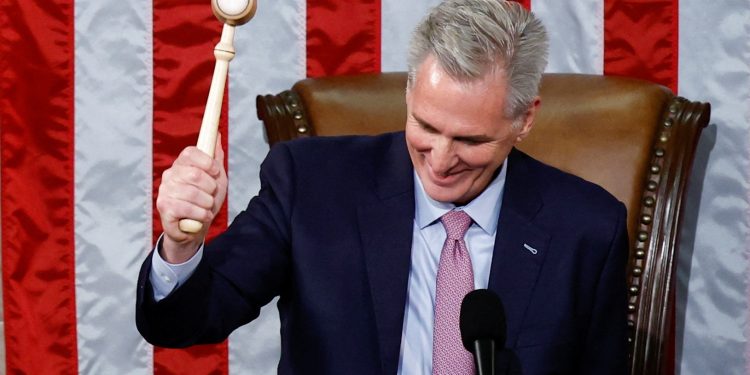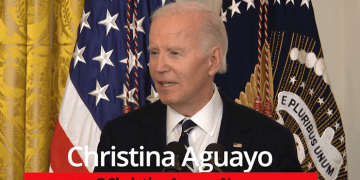Republican Kevin McCarthy was elected House speaker on a historic post-midnight 15th ballot vote, that capped off a chaotic week as the new GOP leader attempted to overcome holdouts from his own ranks,
“My father always told me, it’s not how you start, it’s how you finish,” McCarthy told cheering fellow Republicans.
Eager to confront Joe Biden and the Democrats, he promised subpoenas and investigations. “Now the hard work begins,” the California Republican declared. He credited President Donald Trump for standing with him and for making late calls “helping get those final votes.”
Republicans roared in celebration when his victory was announced, chanting “USA! USA!”
After he was elected, McCarthy took the oath of office, and the House was finally able to swear in newly elected lawmakers who had been waiting all week for the chamber to formally open and the 2023-24 session to begin.
After four days of grueling ballots, McCarthy flipped more than a dozen conservative holdouts to become supporters, including the chairman of the chamber’s Freedom Caucus.
He fell one vote short on the 14th ballot, and the chamber became raucous, unruly.
McCarthy strode to the back of the chamber to confront Republican Matt Gaetz, sitting with Lauren Boebert and other holdouts. Fingers were pointed, and words exchanged.
At one point, Republican Mike Rogers of Alabama, shouting, approached Gaetz before another Republican, Richard Hudson, pulled him back.
“Stay civil!” someone shouted.
Order restored, the Republicans fell in line to give McCarthy the post he had fought so hard to gain, House speaker, second in the line of succession to the presidency.
The few remaining Republican holdouts began voting present, dropping the tally he needed.
The tally was 216-212.
The night’s stunning turn of events came after McCarthy agreed to many of the detractors’ demands — including the reinstatement of a longstanding House rule that would allow any single member to call a vote to oust him from office.
One significant former holdout — Republican Scott Perry, chairman of the conservative Freedom Caucus, who had been a leader of Trump’s efforts to challenge the 2020 election — tweeted after his switched vote for McCarthy, “We’re at a turning point.”
Another Republican holdout, Byron Donalds of Florida, who was repeatedly nominated as an alternative candidate for speaker, switched Friday too, voting for McCarthy.
Trump may have played a role in swaying some holdouts — calling into a meeting of Republican freshmen the night before, and calling other members ahead of voting. He had urged Republicans to wrap up their public dispute.
The House adjourned Friday until late in the night, giving time for last-minute negotiations and allowing two absent Republican colleagues to return to Washington.
Newly elected Wesley Hunt of Texas arrived to vote for McCarthy — to applause, days after his wife had given birth — as did Ken Buck of Colorado.
The agreement McCarthy presented to the holdouts from the Freedom Caucus and others centers around rules changes they have been seeking for months. Those changes would shrink the power of the speaker’s office and give rank-and-file lawmakers more influence in drafting and passing legislation.
Other wins for the holdouts are more obscure and include provisions in the proposed deal to expand the number of seats available on the House Rules Committee; to mandate 72 hours for bills to be posted before votes; and to promise to try for a constitutional amendment that would impose federal limits on the number of terms a person could serve in the House and Senate.












